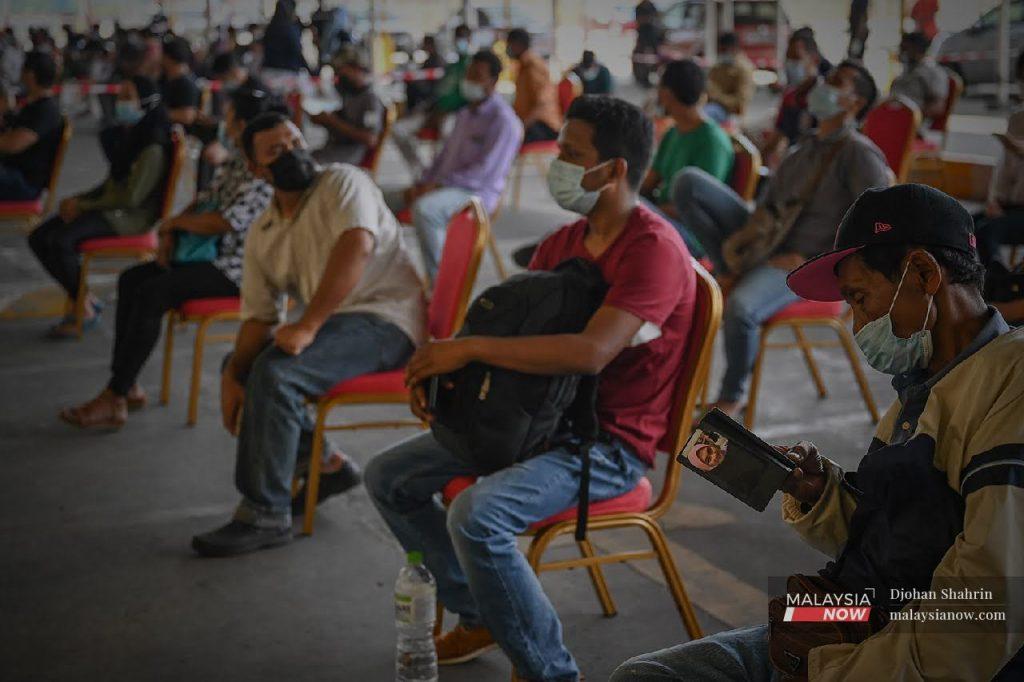Why the government should not deport Myanmar migrants
The risk of inadvertently breaching international legal obligations and causing undocumented workers to avoid getting vaccinated against Covid-19 are some of the reasons the government should rethink its plan.
2020 was a long and difficult year for Malaysia. The battle against Covid-19 took centre stage, but also proved a catalyst for other issues to be thrust into the spotlight: socioeconomic inequality, poverty, domestic violence and of course, xenophobia.
Now, a glimmer of light appears at the end of the tunnel: the coronavirus vaccine is set to arrive on our shores this month and with the government’s rollout plan targeting 126,000 individuals a day including foreign workers, it appears that Malaysia may be able to get a handle on the virus.
However, xenophobia is just as fatal and destructive as any virus. Even as the government tells Malaysians that foreigners must be vaccinated for humane reasons, it has agreed to deport a whopping 1,200 Myanmar nationals back to their country which recently underwent a military coup.
This decision is not just a human rights violation but could also prove dangerous for Malaysian society as well as Malaysia’s foreign policy interests.
It may breach our international legal obligations
Non-refoulement, a key principle of international human rights law, prohibits the return of individuals to a country where they would face torture, cruel, inhuman or degrading treatment or punishment, or other irreparable harm.
The government has said that those who will be deported are workers accused of lacking valid travel documents and overstaying their visas, and that no Rohingya or United Nations-registered refugees will be deported.
However, the government has not clarified how it has established this. The United Nations refugee agency has not been able to access detention centres since 2019, and so cannot determine whether these detainees would qualify as refugees. The agency has also told the media that it is currently seeking more information, and pointed out that women and children in vulnerable situations may be among those held in these centres.
Given this ambiguity, it is paramount that the government at very least delay the deportation process until and unless it can provide the United Nations with access to these 1,200 people to ensure that they are indeed merely economic migrants and not vulnerable or oppressed peoples.
If the government fails to do so, it may unknowingly violate the principle of non-refoulement.
It will legitimise the Tatmadaw after our initial firm stance criticising the coup
Last week, Prime Minister Muhyiddin Yassin conducted a diplomatic visit to Indonesia where he met with President Joko Widodo.
At this meeting, the two leaders agreed that the military takeover in Myanmar by the Tatmadaw was a cause for concern and that their respective Foreign Ministers would push for an Asean-wide meeting to discuss the matter.
This came after the government released a strongly-worded statement condemning the coup and asking the Tatmadaw to prioritise peace and stability.
If the Malaysian government were to now cooperate with Myanmar’s new, unconstitutional leadership, it would send a signal to not just Asean but also the world that it is prepared to parlay with and therefore legitimise the military.
It would also make any future statements or en bloc meetings a paper tiger – big words that are ultimately ineffectual.
It will cause undocumented foreign workers to avoid being vaccinated
Domestically, this deportation exercise will cause great harm to Malaysians who are currently obeying shelter-in-place directives and doing their level best to flatten the curve.
With an economy heavily reliant on migrant workers – both documented and undocumented – it is necessary that all workers here are vaccinated to prevent the spread of the virus.
Covid-19 does not see race, religion or immigration status, and new clusters can and will blossom if a large section of the populace is left untreated.
A deportation exercise will spook migrant workers and cause them to go to ground out of fear of being repatriated. Workers in sectors such as construction or F&B may report for work as normal, but avoid presenting themselves for vaccination and instead flee the authorities.
Given that there are at least two million undocumented migrant workers in Malaysia, it is dangerous to public health to have a group this large potentially remain unvaccinated.
If the government is serious about addressing the pandemic holistically, it cannot run the risk of having migrant workers avoid this essential measure.
So what now?
Given these factors, it is extremely unwise for the government of Malaysia to continue with this deportation exercise, regardless of detention centre capacity. It is high time for the government of Malaysia to allow lawyers and activists into detention centres to determine the status of those held and release asylum-seekers into the community – this would automatically ease overcrowding.
An amnesty programme would also go a long way towards bolstering trust in the government among the migrant community while we work on our larger labour policies.
The government should also continue to engage with its Asean partners to address the regional issues posed by the coup in Myanmar, and maintain its pledge to uphold principles of international law.
Mahajoth Singh is with rights group Lawyers for Liberty.
The views expressed in this article are those of the author(s) and do not necessarily reflect the position of MalaysiaNow.
Subscribe to our newsletter
To be updated with all the latest news and analyses daily.
